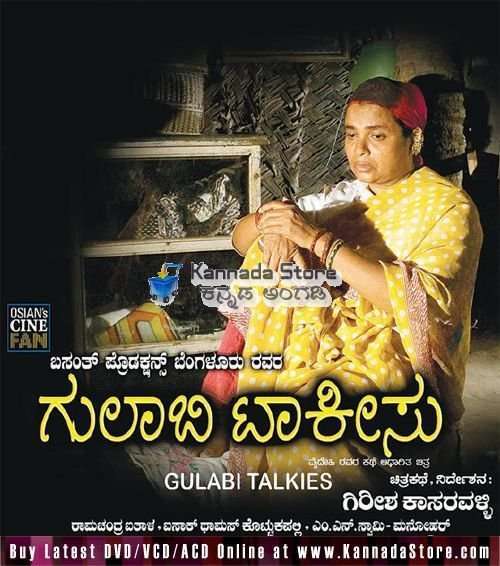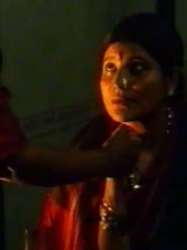Gulabi Talkies is a film of genre Drama directed by Girish Kasaravalli with Umashree
Gulabi Talkies (2008)

If you like this film, let us know!
Gulabi Talkies is a 2008 Indian Kannada language film by acclaimed Indian director Girish Kasaravalli. It is based on a short story by the same name by Kannada writer Vaidehi.
The film premiered at the Osian's Cinefan Festival of Asian and Arab Cinema in New Delhi on 14 July 2008, where it won the Best Film and Best Actress awards in the Indian Competition section. Umashree won the National Award for Best Actress for her performance in the film.
Synopsis
The film is set in the late 1990s among the fishing communities around Kundapura, in the southwestern Indian state of Karnataka. The impulsive midwife Gulabi (Umashree) is the protagonist, whose one passion is the cinema. She leads a lonely life in an island inhabited by fisher folk. Her husband Musa (K.G. Krishna Murthy), a small-time fish-selling agent, has deserted her and is living happily with his second wife Kunjipathu and their child Adda.Actors
Comments
Leave comment :
Suggestions of similar film to Gulabi Talkies
There are 56 films with the same actors, 12 films with the same director, 61698 with the same cinematographic genres, to have finally 70 suggestions of similar films.If you liked Gulabi Talkies, you will probably like those similar films :

Haseena (2004)
Directed by Girish Kasaravalli
Genres Drama
Actors Tara, Chitra Shenoy
Rating80%





The film, based on the story Kari Nagaragalu by Kannada writer Banu Mushtaq, looks at Hasina (Taara) who marries auto driver Yakub (Chandrahas Ullal) against his mother's wishes. The couple have three daughters the visually impaired Munni, Shubby and Habeeb. Pregnant with their fourth child, the couple break social codes and do a pregnancy scan to ascertain the baby's gender. When Yakub realises it is yet another girl, he becomes at turns abusive and neglectful, eventually leaving Hasina to fend for herself.

The Island (2002)
, 2h14Directed by Girish Kasaravalli
Genres Drama
Actors Soundarya, Avinash, Harish Raj
Rating77%





Located in the backwaters of a dam, Sita Parvata is an island slowly submerging due to the rains. The government succeeds in evacuating the residents by giving them compensation for the properties they own. The village temple priest Duggajja, his son Ganapa, and his daughter-in-law Nagi find it impossible to leave their homeland and make a living with the meagre compensation given by the government. They have but a small hut, which earns them a compensation of ₹25,000. In Ganapa's own words, the compensation can give them food and shelter, but cannot compensate for the love and respect of their people. On the island, they are important people, but outside, they would be one among hundreds of families struggling to make a living. Centered around this complex theme, the film narrates the struggles of the family and how ultimately in the end they manage to continue life on the island.

Ek Ghar (1991)
, 1h57Directed by Girish Kasaravalli
Genres Drama
Actors Naseeruddin Shah, Deepti Naval, Rohini Hattangadi
Rating63%





Mane is a Kafkaesque tale about a young couple (Naseeruddin Shah and Deepti Naval) that moves to the city from a village with the hope of finding privacy and freedom, which are unavailable in the joint family system. For all its narrative excursions, in a sense, Mane is merely about the breakup of a marriage in which the Rossellinian couple, unable to confront each other directly amidst the loneliness of the city, externalizes their troubles – his powerlessness, her desire for freedom and their childlessness – and shifts blame on situations beyond their control in order to act victims. Kasaravalli works wonder with film and sound here, using them to denote the impending break down. (One stunning shot uses the neon lights of the neighbourhood to literally break apart the frame). A critique on urban spaces that suffocate more than they promise privacy, Mane unfolds like a sociological update on Rear Window (1954), in which personal anxieties and fears are displaced onto the surroundings and, specifically, onto a lower social class. In that sense, Mane connects all the way to the director’s latest work in the manner in which it raises questions about the visibility of the class structure and the seeming imperceptibility of the consequences of acts of one class on the other. Mane is full of such encroachments of freedom by other competing notions of freedom – between classes, between houses and between spouses.

Tabarana Kathe (1986)
, 1h50Directed by Girish Kasaravalli
Genres Drama
Actors Charuhasan
Rating78%





Tabarana Kathe is the story of Tabara Shetty, a government servant in the ranks of a watchman. Tabara Shetty serves the government till his retirement. He is a dedicated worker and respects the system that sustained him for so long. But problems emerge after his retirement.

The Ritual (1977)
, 1h48Directed by Girish Kasaravalli
Genres Drama
Actors Ajith Kumar, P. Santha Kumari, Suresh
Rating73%





A young Brahmin Vedic school student, who is from an aristocratic family, befriends his school master's daughter who is a pregnant widow. The boy tries but fails in concealing his friend's pregnancy. The widow has an abortion forced on her, has the eponymous ritual performed on her and is excommunicated. The student returns home as his school shuts down.

Kraurya (1995)
, 1h58Directed by Girish Kasaravalli
Genres Drama
Actors H. G. Dattatreya
Rating26%





Kraurya is the story of Rangajji, a widow who loves to tell stories of fantasy to the children of her village. Rangajji's hardships start when her only son dies young mysteriously. Rangajji goes to live with a distant relative of hers, only to receive a cold welcome. Life goes on endlessly for Rangajji. She longs to tell stories to children, but her freedom is severely restricted. While she spends every day in boredom, Murty the youngest son of the family becomes close to Rangajji. Rangajji feels a new lease of life when the eldest son of the family Subbanna decides to go to Bangalore to start his own private business. Rangajji lends the money Subbanna needs, thinking that Subbanna might help her find her husband's close friend Mr.Padmanabiah in Bangalore. Subbanna leaves for Bangalore. After a few months Rangajji leaves for Bangalore along with Murty only to receive another cold welcome from Subbanna. She tries to find Mr.Padmanabiah with Murty's help. When her search ends, she comes to know that Mr.Padmanabiah is no more. Her last ray of hope dims out and leaves her in a state of mental shock, desperation and defeat. She loses her will to live. Murty decides to take her back to the village. But a spate of events during the journey back to the village leaves Rangajji physically wounded. Murty tries to take control of the situation, but a small boy that he is, he fails. The climax of the film shows Rangajji in an unconscious state lying in the police station, while Murty afraid the police might arrest him for murder makes a desperate getaway.

Ek Ghar (1991)
, 1h38Directed by Girish Kasaravalli
Genres Drama
Actors Rohini Hattangadi, Deepti Naval, Naseeruddin Shah
Rating71%





Arriving in the city with a hope to find a cosy little home, Rajanna and Geeta are happy when they find one such house. One day they find a workshop opening up next door. Rajanna is indignant at the noises coming from the workshop but he is helpless. Geeta, meanwhile, gets the shed vacated with the help of the police inspector. Rajanna seeks the help of the workmen who had earlier occupied the shed to take Geeta away from the environment. But discovers that their slum is being demolished to make way for a multinational.

Naayi Neralu (2006)
, 2h10Directed by Girish Kasaravalli
Genres Drama
Rating82%





Acchanniah lives with his wife Nagalakshmi and his widowed daughter-in-law Venkatalakshmi in a remote village in Karnataka. His granddaughter Rajalakshmi is in a distant city completing her studies. Acchanniah learns from a friend that a young man in a distant village claims that he was the son of Acchanniah in his previous birth. He dismisses the information as baseless. But his ailing wife believes or rather chooses to believe that her son who died twenty years ago has come back.

Kanasemba Kudureyaneri (2010)
, 1h44Directed by Girish Kasaravalli
Actors Umashree, Vijanath Biradar
A story has a beginning, middle and an end, but it's not necessary that they be in that order. Girish Kasarvalli's award-winning Kanasemba Kudureyaneri (based on Amaresh Nugadoni's Savaari) is a classic example of this.

Thai Saheba (1997)
Directed by Girish Kasaravalli
Actors Suresh Heblikar
Rating71%





The film is based on the story of a Brahmin family during the pre independence and post independence periods of India. The protagonist Narmada Thayi is the second wife of Appa Sahib, a freedom fighter. The childless couple decide to adopt the child of Venkobanna, a close relative. Venkobanna has other plans in mind when he gives away his child in adoption. He calculates that his son will inherit the family's money and property. In the meanwhile, Appa Sahib also has an illicit relationship with Chandri and a daughter is born to them. Narmada Thayi is a patient woman and although aware of her husband's character, she supports him and the household. After the independence, Appa Sahib supports the government's view that the laborers who till the land own them. Venkobanna is angered to see this long awaited plan of his crumble due to the utopian views of App Sahib. After a brief illness, Appa Sahib leaves the house one day with a group of people to protest for the sake of the farmers never to return again. Months after this, Narmada learns that her husband has been imprisoned by the government. But no other detail regardinhg Appa Sahib comes to light. Narmada Thayi is the only one capable of handling the household. She seeks the help of Venkobanna to help her handle monetary issues. Meanwhile, their adopted son comes of age. The story takes a surprise and unexpected turn when Thayi Saheba discovers that her adopted son is in love with Appa Sahib's mistress's daughter, who legally is his sister. She tries in vain to convince her son not to go against social ethics. With Chandri, Narmada Thayi sets out to find her husband. Together they travel to many prisons, but Appa Sahib is never found. Thayi Saheba must either save the son, who seeks freedom to marry Chandri's daughter or save herself because if she supports the marriage, she could be jailed. She tries to cancel the adoption, but no such thing as adoption cancellation existed then. She also tries to see if somebody can adopt Chandri's daughter, but adopting a girl child was never allowed. Finally, Thayi Saheba tells her son that he is free to do whatever he wants. She gets ready to face the serious consequence of the marriage. The film ends with Thayi Saheba waiting on the steps of her house and an angered Venkobanna arriving with the police and announcing their arrival.
 Connection
Connection

